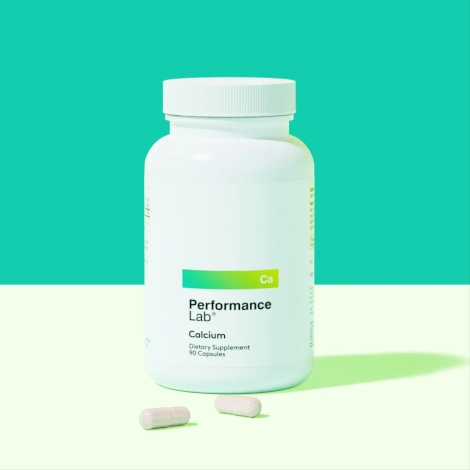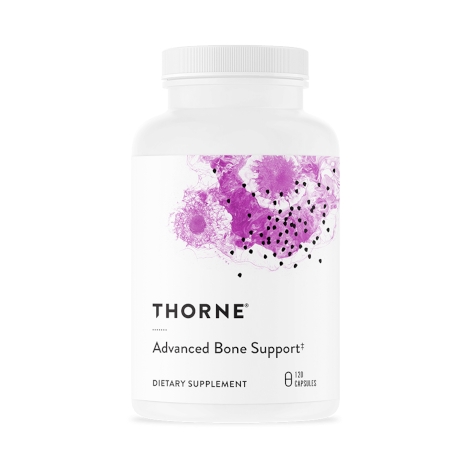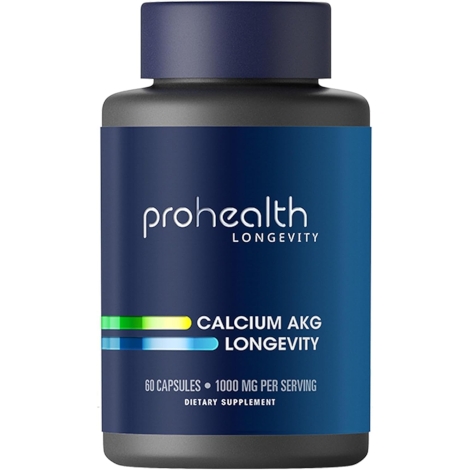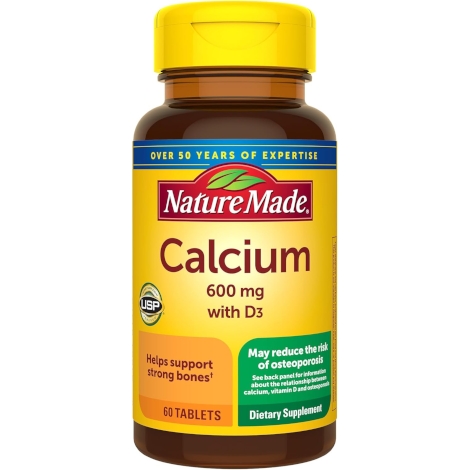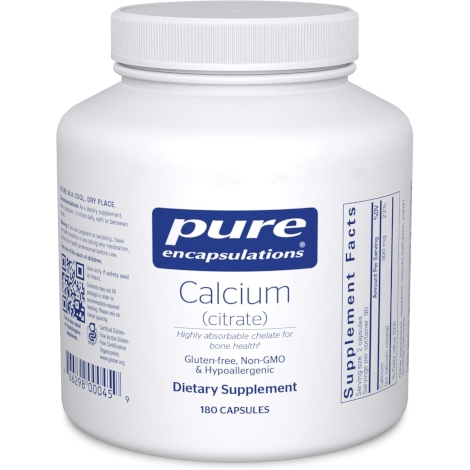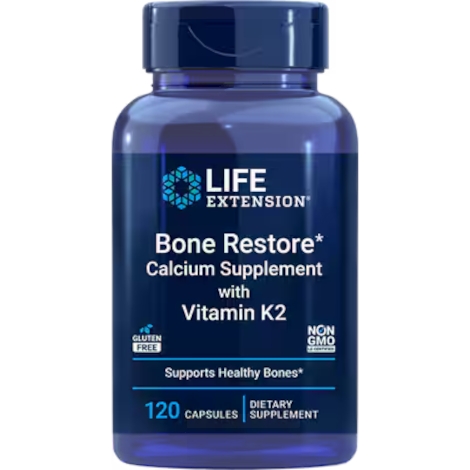We test and review fitness products based on an independent, multi-point methodology. If you use our links to purchase something, we may earn a commission. Read our disclosures.

On our mission to find the best calcium supplements, our crew of testers used good ol’ teamwork to divide and conquer, testing a variety of brands until we identified the top contenders out there. However, unless you’re actively suffering from osteoporosis, why take calcium supplements to begin with?
Approximately 98% of our body’s calcium1 is stored in our bones and we use calcium for more than just healthy bones, but also to help muscles including our heart to contract, transmit nerve impulses, and helps blood to clot. If levels of calcium in our body get too low to carry out these processes, that’s when the body starts to steal some from our bones, making them weak and at greater risk of being broken.
RELATED: Best Joint Supplement
The problem is, once bone density is lost, it’s pretty hard to get it back, especially as we get older or are postmenopausal. This is why it’s important for even young and healthy individuals to make sure they are consuming enough calcium. If you aren’t getting enough from dietary sources, a calcium supplement can help. These are our picks for the best ones on the market.
Medical disclaimer: This article is intended for educational and informational purposes only. It is not intended as a substitute for medical advice. For health advice, contact a licensed healthcare provider.
The 6 Best Calcium Supplements of 2025
Best Calcium Supplement Overall: Performance Lab Calcium
Good for: Those looking for a calcium supplement backed by actual physicians
Performance Lab Calcium
With its algae-sourced formula and vegan certification, Performance Lab Calcium is a niche pick with big appeal for plant-based users who want clean, traceable supplements.
Best Calcium Supplement for Bone Health: Thorne Advanced Bone Support
Good for: People looking for both calcium and Vitamin D for better bone support
Thorne Advanced Bone Support
Pros
Thorne Advanced Bone Support is a top-tier, third-party-tested pick that brings everything you want for stronger bones in one clean formula.
Best Vegan Calcium Supplement: ProHealth Ca AKG Supplement
Good for: Vegans who lack calcium-rich foods and require a high-dose calcium supplement
Pro Health Calcium AKG Longevity
Pros
Cons
This isn’t your standard calcium supplement. With a longevity-focused formula built around calcium AKG, it’s best for users looking for more than bone support.
Best Budget Calcium Supplement: Nature Made Calcium
Good for: People who want a great value who have no issues swallowing tablets
Nature Made Calcium and Vitamin D
Nature Made delivers a budget-friendly and effective combo of calcium and vitamin D3 that’s easy to find and trusted by third-party labs.
Best Single-Ingredient Calcium Supplement: Pure Encapsulations Calcium
Good for: Those who want to buy a clean calcium supplement that covers multiple months
Pure Encapsulations Calcium Citrate
Pros
Cons
A clean and clinically respected option, Pure Encapsulations Calcium Citrate is a smart pick for those who want pure calcium in a gentle, well-absorbed form.
Best Calcium Supplement with Vitamin K: Life Extension Bone Restore
Good for: Individuals looking to support bone health with a high-dose supplement
Life Extension Bone Restore
Cons
A strong pick for anyone wanting more than just calcium, Bone Restore covers a lot of nutritional ground for those focused on bone strength and longevity.
How We Picked and Tested the Best Calcium Supplements
A common mineral that fills a lot of need in supplement form, so there were plenty of brands to choose from. Here’s a bit of the criteria we used to narrow the choices down to our list of the best calcium supplements.
Calcium Dosage
One of the most important features of a calcium supplement (or any new supplement for that matter), we wanted to make sure that we provided not only supplements with adequate calcium, but some that have a range of different potencies. This is because some people may need more calcium from supplements than others.

RELATED: Best Dairy-Free Meal Delivery
For those taking calcium supplements simply to fill some gaps in their diet, brands on this list with lower doses is appropriate. However, certain populations such as women over the age of 50, vegans who do not consume dairy products, or people who have issues eating enough calcium-fortified foods in general may need higher doses. That’s why we sought to provide a range on this list.
Price
Daily supplements can be an expensive habit if you get carried away. That’s why it’s vital to choose brands that provide the best balance between price and quality. Considering this, we wanted to provide just that with the brands on our list.
Customer Reviews and Side Effects
Unlike a multivitamin which usually contains smaller amounts of a myriad of micronutrients, minerals like calcium that are taken in isolation have a higher chance of causing unpleasant side effects. These side effects usually affect the belly and gut area and are typically mild, but we wanted to choose brands that spare you from such treatment.
So, not only did we test each of these products personally (as we’ve been known to do), we also scoured the customer reviews of verified buyers to see if there was any overwhelmingly negative feedback in terms of side effects before making our recommendations.
Benefits of Calcium Supplements
It is always useful to have a key nutrient like calcium as a supplement available where it is needed, especially if you cannot consume enough food sources of calcium for whatever reason. Not only are strong bones important for overall health, independence, and mobility, but they are vital for active populations to prevent injury. So, let’s take a closer look at the benefits of getting enough calcium.
Helps Prevent Bone Loss
As we’ve all been aware of since high school health class, calcium is key for strong bones. Though we should make an effort to get as much of our calcium intake as possible from food, sometimes this isn’t possible, especially if you have conditions like lactose intolerance or allergies to dairy that can prevent you from eating traditionally high calcium foods.
RELATED: Transparent Labs Vegan Protein Review
Furthermore, certain conditions like menopause can cause individuals to experience bone loss at a rapid rate that dietary consumption just can’t keep up with. That’s why it’s important to consume adequate calcium early, especially if you are female, to strengthen the bones before this occurs.

Indeed, one meta-analysis found that women under the age of 35 had improved bone density after taking a daily calcium supplement9. Another recent study showed that women who are already menopausal who begin taking calcium supplements did see a slower rate of bone loss, but it did not lower their risk of fractures10.
Can Help Reduce High Blood Pressure
There has been some science that’s asserted that calcium supplementation can help reduce the risk of heart disease. In addition to sodium, magnesium, and potassium, calcium plays a key role in muscle contractions and relaxations, with the heart being the most important muscle of them all.
One study showed that increased calcium intake lowered both systolic and diastolic blood pressure in young individuals without high blood pressure. Though the decrease was only about 2mmHg, study authors insist even this small change lowers the risk of death from heart attack by 7% and risk of stroke by 10%11.
On the other hand, there are just as many studies, one following subjects for seven years, that show that calcium supplementation has no impact12 on the risk of high blood pressure.
Finally, though, there is promising evidence that calcium can influence the risk of preeclampsia, a life threatening condition pregnant women can develop that’s characterized by dangerously high blood pressure that can lead to premature birth, blunting of fetal growth, and even death of the mother. Studies show that supplementation of 500 mg of calcium carbonate daily could help13 safely prevent the development of preeclampsia in pregnant women.
RELATED: Does Cardio Lower Blood Pressure? What the Research Says
Helps Reduce Risk of Colon Cancer
Several studies have suggested that both calcium supplements and dietary calcium may lower the risk of colon cancer, with one metanalysis asserting that there is a 6% decrease in risk for every 300mg of calcium consumed daily when taken alongside at least 100 IUs14 of Vitamin D3 as well.
May Support Weight Loss
Some studies have shown low intake of calcium has been associated with higher body fat percentage, especially when accompanied with low levels of Vitamin D3. Some science has shown that the combination of these two supplements, with daily intake, resulted in more weight loss in overweight and obese subjects15 than those who were not taking the supplements.

Nevertheless, the authors noted that the weight loss was so insignificant, only a few pounds over 8 weeks to 2 years, that it is unlikely to justify supplementing calcium for the purposes of weight loss alone.
Potential Side Effects
Calcium supplements are generally safe when taken as directed. However, some people in rare cases have experienced GI issues like constipation, gas, bloating, and nausea. It’s important to remember that minerals in their supplement form are metals that technically aren’t meant to be absorbed by the gut, so that is the likely reason for these effects.
If you take too much calcium (1,200–1,500 mg per day) you may also see an increased risk of kidney stones, high levels of calcium in the blood, and calcium buildup in the blood vessels that could increase the risk of high blood pressure. If you take iron supplements, you shouldn’t take them at the same time as calcium as iron can block the absorption of calcium16.
RELATED: Best Iron Supplement
You also should avoid taking calcium if you already take medications for osteoporosis, antibiotics, diuretics, and certain thyroid medications. Always get medical advice from your healthcare provider before taking dietary supplements like calcium.
How Much Calcium Should I Take Per Day?
To understand what the proper dosage is for a good calcium supplement, let us first take a look at the amount of calcium that the National Institutes of Health recommends that each American has on a daily basis.
For women 50 and younger and men 70 and younger, the USDA recommends a daily intake of 1,000 milligrams of calcium. If you are a woman over the age of 50 and a man over the age of 70, your calcium needs are slightly higher at 1,200 milligrams per day.
Older adults require more calcium because they have a higher risk of osteoporosis as the natural process of aging involves bone loss. Older women in particular are at an even higher risk of lower bone density due to menopause.
Estrogen plays a huge role in maintaining bone health and postmenopausal women experience a characteristic drop in estrogen after menopause occurs. What usually follows is bones that are less dense, which puts women at a higher risk of osteoporosis and bone fractures when compared to men.

That being said, it is also possible to get too much calcium. The upper limit is 2,000 mg of calcium for adults over the age of 51 and 2,500 mg for those 50 and under as established by the National Institutes of Health17.
Calcium intake that surpasses this amount increases the risk of suffering from a calcium toxicity, which can result in side effects like kidney stones, nausea, vomiting, constipation, iron and zinc malabsorption, and a hazardous amount of calcium levels in the blood and soft tissues.
This is why most calcium supplements do not contain 100% of the daily value of calcium (the 1,000-1,200mg mentioned earlier). So, if your selected calcium supplement doesn’t have this amount, don’t write it off as a bad product. It’s important to remember that there are many dietary sources of calcium we may be consuming without realizing it, so we have to account for calcium-rich foods along with supplements to avoid potential toxicity.
RELATED: The Best Zinc Supplements
With all of that in mind, most experts recommend taking only around 500 milligrams of calcium per day18 from supplements. Some may need a higher dose if they are older or already have existing bone health issues, but most individuals will want to stay around this number. Another critical reason is that elemental calcium from supplements is not as easily absorbed as dietary calcium, so getting more than this can result in GI issues and malabsorption.

Now that that’s out of the way, it’s a good idea to know what are some high calcium foods you can find in your diet to either keep track of your calcium intake or potentially eliminate the need for supplements altogether:
- Dairy products like milk, cheese, kefir, yogurt, and whey protein (plant based cheeses, yogurts, and milks, with the exception of soy milk, are not natural sources of calcium unless they are calcium-fortified)
- Legumes like lentils, beans, and edamame
- Tofu
- Leafy greens like kale, spinach, and bok choy
- Fish with edible bones like sardines, anchovies and smelt
- Tahini
Buying Guide: What to Look for in the Best Calcium Supplements
Anxious about purchasing the right product? Never fear. Keep these factors in mind as you search the labels on your next calcium supplement.
Inclusion of Vitamin D3
While this is by no means a requirement to establish a calcium supplement as worth your money, it definitely can help a tiebreaker if you’re struggling to decide between several choices. Ask any dietitian, the body cannot use or absorb calcium in any significant capacity if Vitamin D is not present.
The problem is, there are surprisingly few food sources of Vitamin D that are natural, with the most common sources being egg yolks and fish, but not a ton else. Most of the Vitamin D we get actually comes from fortified foods like orange juice and breakfast cereals. This is one reason Vitamin D supplements have recently risen in popularity.
RELATED: Vitamin D3 Benefits: Beyond Bone Health

However, if you don’t eat these foods, you could be in trouble, especially if you’re a vegan who does not eat dairy, eggs, or fish. And if that’s the case, taking a calcium supplement is simply a waste of time and money. So, having Vitamin D already included in your can save you a ton of hassle and provide peace of mind that you’re getting all that you need.
Serving Size
To get the proper amount of calcium, this often means the nutrient being housed in capsules and tablets that are larger than normal. If this is the case with one particular supplement, it’s more ideal for you to not have to take 10 of the things each morning. So, assess how skilled you are at taking pills and let that weigh in your decision to choose which brand to buy based on the serving size.
Form of Calcium
There are several forms of calcium supplements out there, with the most common being calcium citrate and calcium carbonate. Due to the nature of these forms of calcium, it’s important to select the one that’s right for you.
Calcium citrate has been found to be the more expensive form, but is the most optimally absorbed. This makes it appropriate for people who cannot take their calcium with food, have health conditions that result in a sensitive gut, or who have low levels of stomach acid which can negatively affect absorption of calcium in other circumstances.
Calcium carbonate, on the other hand, is a good choice if you’re working on a budget. It also contains more elemental calcium by volume, so you can take a smaller serving size which is ideal for those who have trouble with large serving sizes.
RELATED: The Best Vitamin Brands
FAQs About the Best Calcium Supplements
What is the most effective form of calcium supplement?
Calcium carbonate contains 40% elemental calcium which means you can get a higher dose in a smaller serving, but there is an increased risk of experiencing side effects.
Which brand of calcium supplement is best?
Which calcium is best for osteoporosis?
Calcium supplements that include Vitamin D3 and other synergistic micronutrients are better than those that contain calcium alone.
What is the fastest way to increase calcium?
Eating enough calcium-rich foods is actually the fastest way to increase calcium levels as the body absorbs dietary sources of calcium better than calcium supplements, so contact a registered dietitian if you’re unsure how to identify food sources.
These statements have not been evaluated by the Food and Drug Administration. This product is not intended to diagnose, treat, cure, or prevent any diseases.
References
- Institute of Medicine (US) Committee to Review Dietary Reference Intakes for Vitamin D3 and Calcium, Ross AC, Taylor CL, Yaktine AL, Del Valle HB, eds. Dietary Reference Intakes for Calcium and Vitamin D3. Washington (DC): National Academies Press (US); 2011.
- Rondanelli M, Minisola S, Barale M, et al. Evaluating adherence, tolerability and safety of oral calcium citrate in elderly osteopenic subjects: a real-life non-interventional, prospective, multicenter study. Aging Clin Exp Res. 2024;36(1):38. Published 2024 Feb 12. doi:10.1007/s40520-024-02696-9
- Groenendijk I, van Delft M, Versloot P, van Loon LJC, de Groot LCPGM. Impact of magnesium on bone health in older adults: A systematic review and meta-analysis. Bone. 2022;154:116233. doi:10.1016/j.bone.2021.116233
- Bailey RL, van Wijngaarden JP. The Role of B-Vitamins in Bone Health and Disease in Older Adults. Curr Osteoporos Rep. 2015;13(4):256-261. doi:10.1007/s11914-015-0273-0
- Voulgaridou G, Papadopoulou SK, Detopoulou P, et al. Vitamin D and Calcium in Osteoporosis, and the Role of Bone Turnover Markers: A Narrative Review of Recent Data from RCTs. Diseases. 2023;11(1):29. Published 2023 Feb 8. doi:10.3390/diseases11010029
- Naciu AM, Tabacco G, Bilezikian JP, et al. Calcium Citrate Versus Calcium Carbonate in the Management of Chronic Hypoparathyroidism: A Randomized, Double-Blind, Crossover Clinical Trial. J Bone Miner Res. 2022;37(7):1251-1259. doi:10.1002/jbmr.4564
- Liu C , Kuang X , Li K , Guo X , Deng Q , Li D . Effects of combined calcium and Vitamin D3 supplementation on osteoporosis in postmenopausal women: a systematic review and meta-analysis of randomized controlled trials. Food Funct. 2020;11(12):10817-10827. doi:10.1039/d0fo007
- Maresz K. Proper Calcium Use: Vitamin K2 as a Promoter of Bone and Cardiovascular Health. Integr Med (Encinitas). 2015;14(1):34-39.
- Liu Y, Le S, Liu Y, et al. The effect of calcium supplementation in people under 35 years old: A systematic review and meta-analysis of randomized controlled trials. Elife. 2022;11:e79002. Published 2022 Sep 27. doi:10.7554/eLife.79002
- Bailey RL, Zou P, Wallace TC, et al. Calcium Supplement Use Is Associated With Less Bone Mineral Density Loss, But Does Not Lessen the Risk of Bone Fracture Across the Menopause Transition: Data From the Study of Women’s Health Across the Nation. JBMR Plus. 2019;4(1):e10246. Published 2019 Nov 15. doi:10.1002/jbm4.10246
- Cormick G, Ciapponi A, Cafferata ML, Cormick MS, Belizán JM. Calcium supplementation for prevention of primary hypertension. Cochrane Database Syst Rev. 2022;1(1):CD010037. Published 2022 Jan 11. doi:10.1002/14651858.CD010037.pub4
- Margolis KL, Ray RM, Van Horn L, et al. Effect of calcium and Vitamin D3 supplementation on blood pressure: the Women’s Health Initiative Randomized Trial. Hypertension. 2008;52(5):847-855. doi:10.1161/HYPERTENSIONAHA.108.114991
- Gomes F, Ashorn P, Askari S, et al. Calcium supplementation for the prevention of hypertensive disorders of pregnancy: current evidence and programmatic considerations. Ann N Y Acad Sci. 2022;1510(1):52-67. doi:10.1111/nyas.14733
- Lopez-Caleya JF, Ortega-Valín L, Fernández-Villa T, Delgado-Rodríguez M, Martín-Sánchez V, Molina AJ. The role of calcium and Vitamin D3 dietary intake on risk of colorectal cancer: systematic review and meta-analysis of case-control studies. Cancer Causes Control. 2022;33(2):167-182. doi:10.1007/s10552-021-01512-3
- Cormick G, Ciapponi A, Harbron J, et al. Calcium supplementation for people with overweight or obesity. Cochrane Database Syst Rev. 2024;5(5):CD012268. Published 2024 May 9. doi:10.1002/14651858.CD012268.pub2
- Abioye AI, Okuneye TA, Odesanya AO, et al. Calcium Intake and Iron Status in Human Studies: A Systematic Review and Dose-Response Meta-Analysis of Randomized Trials and Crossover Studies. J Nutr. 2021;151(5):1084-1101. doi:10.1093/jn/nxaa437
- Office Of Dietary Supplements – Calcium. NIH Office of Dietary Supplements.
- Waldman T, Sarbaziha R, Merz CN, Shufelt C. Calcium Supplements and Cardiovascular Disease: A Review. Am J Lifestyle Med. 2015;9(4):298-307. doi:10.1177/1559827613512593



